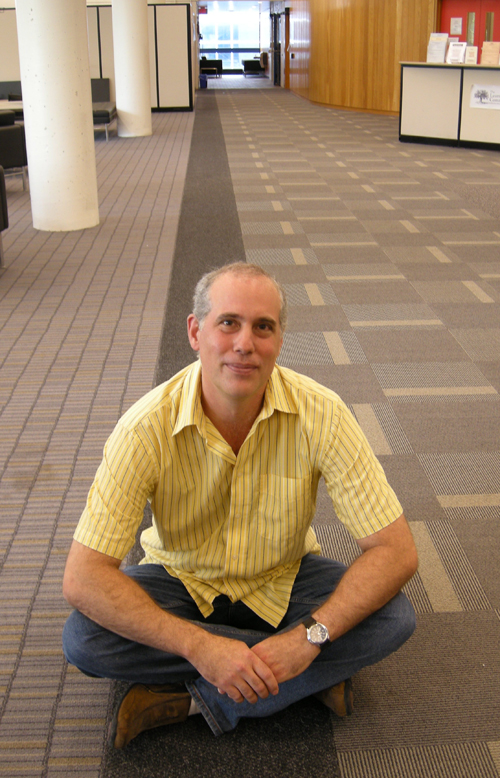
As you walk in through the main door of the University library, you may notice a section of carpet that forms a black line leading away and then turning left. Touch it, and you’ll find that black line is also a different texture than the rest of the carpet. Follow it, and you’ll end up at the newly-renamed Library Accessibility Services office.
That line in the carpet is a “way-finding line” explains co-ordinator Athol Gow. “The open space layout of the first floor of the library is great, but it can be difficult to navigate for people with low vision. The idea of the line in the carpet is that someone using a cane to navigate can actually pick up the different texture by running the cane over it. Someone with low vision will be able to see the line because of the way it contrasts with the other carpeting.”
It’s an expression of the library’s long-standing commitment to making its services more accessible, he adds. “We’re mindful of the fact that the library is an essential resource on campus and that everyone should be able to use it comfortably.”
To this end, the library has worked with campus partners, including physical resources and the campus accessibility committee, over the past decade to improve the accessibility of its drinking fountains, elevators and washrooms. Most recently, the library created a more private study space for students with disabilities.
The former Centre for Students with Disabilities was re-named Library Accessibility Services and moved into an area behind the library’s interior wall, reducing noise and providing extra space for students. “The first floor gets pretty active; at times there was a lot of noise,” explains Gow. Moved from an open area on the first floor to a more private space, the library’s adaptive technology lab now has fewer distractions.
But why the new name?
“We are striving for more positive language, and Library Accessibility Services better reflects our philosophy of support,” says Gow. “Rather than just accommodating individuals with disabilities, we want to focus on removing the physical, technological and attitudinal barriers in our environment that can impede their full participation in campus life.”
Gow adds another reason for the change: some students mentioned that they were uncomfortable using the services under the old name. “The adaptive technology lab was in a very public part of the library. They felt that having to walk in under a large sign reading ‘students with disabilities’ took away their right to choose whether to disclose their disabilities,” he explains. The new location and the more positive name should help reduce this discomfort.
Finally, Gow points out that the Accessibility for Ontarians with Disabilities Act (AODA) is bringing in new standards and requirements, and this may also have an impact on library services. “The standards expect us to provide accessibility supports to all patrons, whether students, staff or members of the larger community. Accordingly, our role and mandate may have to broaden beyond our current focus on student support; the new name better positions us for this.”
He adds: “We are already recognized on campus as a resource for adaptive technology when staff and faculty want to learn more about it.”
Gow has also been actively involved in organizing the Aiming for Accessibility Conference, which has been hosted at U of G for the past two years. This event attracts attendees from post-secondary institutions, municipalities and the private sector across Ontario who want to learn more about ways to enhance accessibility.
“There’s a real hunger for information about the AODA standards, web and multimedia accessibility, way-finding, and other related topics,” Gow says. He sees the conference as a great learning opportunity for U of G staff and faculty who are able to attend and looks forward to helping plan next year’s event.